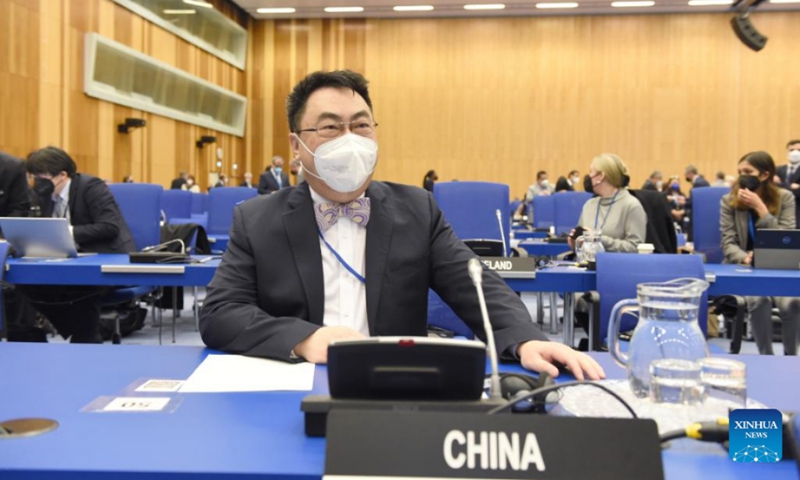
China's Permanent Representative to the United Nations in Vienna Wang Qun attends a meeting convened by the International Atomic Energy Agency (IAEA) Board of Governors to discuss the situation in Ukraine, at Vienna, Austria, March 2, 2022. Wang expressed concerns for the safety of nuclear facilities in Ukraine.(Photo: Xinhua)
China's permanent mission to the United Nations in Vienna urged the chief of the International Atomic Energy Agency (IAEA) not to pull chestnuts out of the fire and not to endorse the nuclear proliferation practices of the US, UK and Australia.
The remarks came after the IAEA Director General Rafael Grossi on Monday submitted a report on the nuclear-powered submarine cooperation under AUKUS to the agency's Board of Governors.
In September 2021, the US, the UK and Australia announced the establishment of AUKUS, under which the US and the UK will assist Australia in acquiring nuclear-powered submarines.
The Chinese mission said the IAEA report selectively cited the AUKUS countries' self-justifying statements while leaving out the international community's major concerns about the nuclear proliferation risks related to the trilateral deal. The report also ignored many countries' solemn positions that AUKUS violates the objective of the Treaty on the Non-Proliferation of Nuclear Weapons (NPT), Xinhua News Agency reported on Wednesday.
Wang Qun, China's Permanent Representative to the United Nations in Vienna, urged IAEA's chief on Tuesday "not to draw chestnuts from the fire" and endorse the nuclear proliferation of the three countries, China's state-owned broadcaster CCTV reported on Wednesday.
The IAEA chief cannot be reduced to a political tool of the AUKUS countries and be used to make misleading conclusions, said Wang.
Grossi's report on AUKUS lacks proper legal basis and authorization from IAEA's member states, Wang pointed out.
Grossi's report has reached a series of conclusions such as the application of the "exception clause" of the comprehensive safeguard agreement for nuclear submarine cooperation in the absence of declaration of relevant nuclear materials and activities by the AUKUS states.
"This is not legal, not legitimate, and absurd," Wang condemned.
Noting that the trilateral nuclear submarine cooperation is the first time in history that two nuclear-weapon states have openly proliferated nuclear weapons material to a non-nuclear-weapon state, the Chinese mission said the IAEA, as a non-proliferation agency, would directly violate its own statute and the NPT if it endorsed the legality of the AUKUS countries' proliferation activities.
The Chinese commission urged the three countries under the AUKUS to immediately stop relevant proliferation activities and called on Grossi to make impartial and objective reports on AUKUS and refrain from endorsing the three countries' proliferation activities.
Global Times




